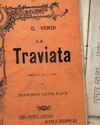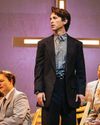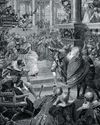
A December night at the Royal Albert Hall. Conductor Brian Kay coaxes from the English Festival Orchestra the familiar sounds, full of promise, of the opening to Messiah... then 'Comfort Ye' and 'Ev'ry Valley' from the solo tenor. Finally, massed banks of altos herald the arrival of the 2,500-strong chorus with 'And the glory of the Lord'. And you can't help breaking into a broad smile. As Kay observes, 'That wall of sound knocks me off my perch every single time.' This year sees the 50th anniversary of the launch (although not under this name) of The Really Big Chorus (TRBC), celebrated with events throughout 2024. There have been TRBC renderings of other choral favourites in the Albert Hall or on summer forays abroad, but the winter Messiahs (always chorally unrehearsed) are still the heart and soul of the choir's activities.
Broadcaster and The Times columnist Libby Purves has been contributing her alto to TRBC Albert Hall Messiahs for many years. 'I could never join a choir because of shift work and freelancing,' she says. 'So, when I heard about TRBC and its openness to us unskilled types who can't really sightread, I got my hands on the Choraline alto parts via the internet. It was a marvellous revelation. The joy is finding yourself singing alongside really good people from real choirs! We learn from them.' Singers arrive each year from around the globe. Norwegian Tor Hagir recalls approaching his first TRBC Messiahs 'with a bit of scepticism because of the sheer number of singers involved.
Denne historien er fra April 2024-utgaven av BBC Music Magazine.
Start din 7-dagers gratis prøveperiode på Magzter GOLD for å få tilgang til tusenvis av utvalgte premiumhistorier og 9000+ magasiner og aviser.
Allerede abonnent ? Logg på
Denne historien er fra April 2024-utgaven av BBC Music Magazine.
Start din 7-dagers gratis prøveperiode på Magzter GOLD for å få tilgang til tusenvis av utvalgte premiumhistorier og 9000+ magasiner og aviser.
Allerede abonnent? Logg på

A way with words
Great operas are inextricably linked with their composer but, asks Jessica Duchen, how often do we acknowledge the important role of the librettist?

THE MAGNIFICENT SEVEN Pick a theme... and name your seven favourite examples
Conductor Domingo Hindoyan nominates the best musical depictions of anger and frustration
A glittering beacon
Until its destruction in the fire of 1936, the Crystal Palace was one of the world's most exciting music venues, and its legacy still lives on today, writes Tom Service.

Christoph Willibald Gluck
Paul Riley traces the wandering existence of a cosmopolitan composer who made it his life's work and ambition to rip up opera's rulebook

The Awards are upon us once more!
Time to vote for the best recordings of the last 12 months

LEADING FROM THE FRONT
From running efficient rehearsals to learning to speak to orchestras with clarity and empathy, an array of exciting courses for conductors has bloomed in recent years, finds Clare Stevens

Kindred spirits
As their second opera takes to the stage, composer Gregory Spears and librettist Tracy K Smith talk to Charlotte Smith about their special partnership

The censors' refusal to play ball drives Verdi to despair
In the early months of 1857, Verdi had Shakespeare on his mind, and specifically King Lear.

11 Bed-Hopping Composers
Jeremy Pound lifts the covers off those notorious notesmiths who found the thrill of playing away simply too hard to resist

André Rieu Violinist, Conductor
King of the Waltz, Dutch musical impresario André Rieu has taken the world by storm with his Johann Strauss Orchestra.